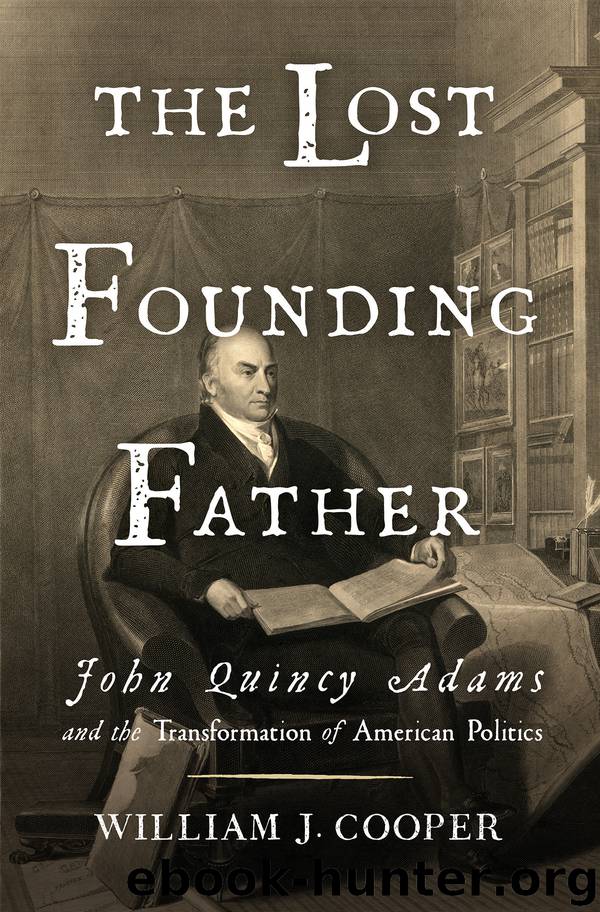The Lost Founding Father by William J. Cooper

Author:William J. Cooper
Language: eng
Format: epub
Publisher: Liveright
Published: 2017-02-19T16:00:00+00:00
CHAPTER 7
—
“The First and Holiest Rights of Humanity”
JOHN QUINCY ADAMS WOULD BECOME A LUMINARY IN CONGRESS during the middle and late 1830s. As the first former president to join the nation’s lawmakers, he automatically received more attention that the average representative. But his rise to prominence in the House coincided with the advent of a fierce slavery-related politics. Since the ratification of the Constitution, the country had previously experienced such a contest only once, the crisis over the admission of Missouri as a state. That wrath passed, however, with the passage of the Missouri Compromise in 1820, a quick and seemingly final solution. But the 1830s did not witness such a quick end to its furor. Although the particulars, actors and issues, might and did change, sectional rancor remained a potent force—a force that never really dissipated. Adams consciously took a leading part in maintaining, and even invigorating, the tension.
From middecade national politicians attempted to utilize political parties as a barrier against sectional battles. Both the Democratic party and the Whig party, which by 1835 had become the chief rival of the Democrats, operated nationally. Thus political success required finding ways to preclude sectional disharmony. This goal provided a cement for the barrier that could at times hold back the sectional tide. But it never ebbed for very long.
With just a tenuous partisan allegiance and in a secure congressional district, Adams had considerable freedom of action. During these years his animosity toward those like Jackson and Calhoun who he judged had unfairly driven him from the presidency meshed with his growing concern about southern influence in the nation. He saw southerners prevailing in his nemesis the Democratic party, which dominated the national government. This especially distressed him because it permitted the southerners to protect the evil of slavery.
He would stand, and fight, for what he defined as the moral purpose and grandeur of his beloved country. Embroiled in that struggle, he became more and more convinced that the nation created by the Founders could not survive without wrenching change. Thus the nationalism of the Founders that he had so cherished and for decades had propounded would perhaps have to be redefined. And he as their lineal disciple would have to lead the way. Congressman Adams was present when the first session of the Twenty-Third Congress convened in early December 1833. The partisanship of pro- and anti-Jackson adherents continued to dominate politics, though with shifting boundaries. Adams still held on to some Antimason affiliations, but that party no longer flourished, for following the election of 1832, Antimasonic leaders in critical states like New York and Pennsylvania realized that their party by itself could no longer seriously contend for statewide office, much less compete nationally.1
The demise of Antimasonry signaled the coalescing of partisans into two parties, the Democratic and the National Republican. Yet that lineup lacked stability. Because Jackson’s personality and policies generated such vigorous opposition as well as staunch loyalty, major anti-Jackson chieftains, led by Henry Clay, worked to create a
Download
This site does not store any files on its server. We only index and link to content provided by other sites. Please contact the content providers to delete copyright contents if any and email us, we'll remove relevant links or contents immediately.
| U.K. Prime Ministers | U.S. Presidents |
Waking Up in Heaven: A True Story of Brokenness, Heaven, and Life Again by McVea Crystal & Tresniowski Alex(37811)
Empire of the Sikhs by Patwant Singh(23086)
We're Going to Need More Wine by Gabrielle Union(19046)
Hans Sturm: A Soldier's Odyssey on the Eastern Front by Gordon Williamson(18592)
Leonardo da Vinci by Walter Isaacson(13336)
The Radium Girls by Kate Moore(12028)
Tools of Titans by Timothy Ferriss(8396)
Educated by Tara Westover(8054)
How to Be a Bawse: A Guide to Conquering Life by Lilly Singh(7486)
Permanent Record by Edward Snowden(5847)
The Last Black Unicorn by Tiffany Haddish(5636)
The Rise and Fall of Senator Joe McCarthy by James Cross Giblin(5280)
Promise Me, Dad by Joe Biden(5153)
The Wind in My Hair by Masih Alinejad(5095)
A Higher Loyalty: Truth, Lies, and Leadership by James Comey(4964)
The Crown by Robert Lacey(4817)
The Iron Duke by The Iron Duke(4356)
Joan of Arc by Mary Gordon(4112)
Stalin by Stephen Kotkin(3966)
